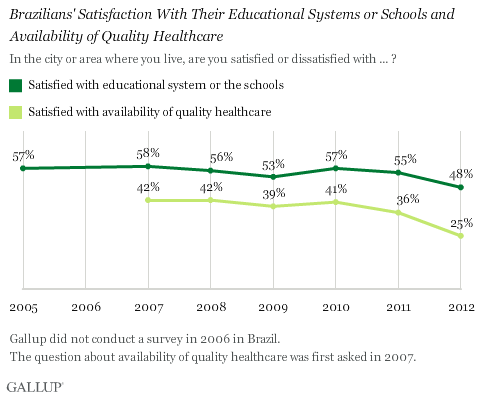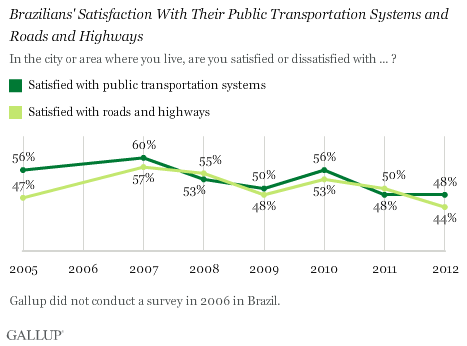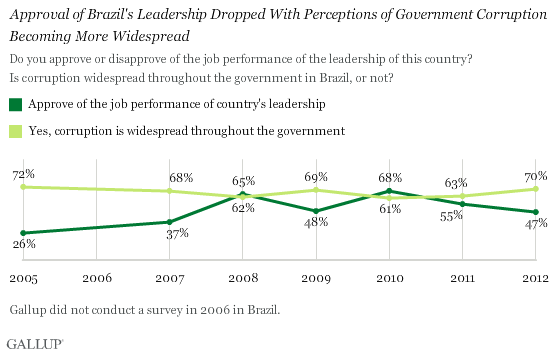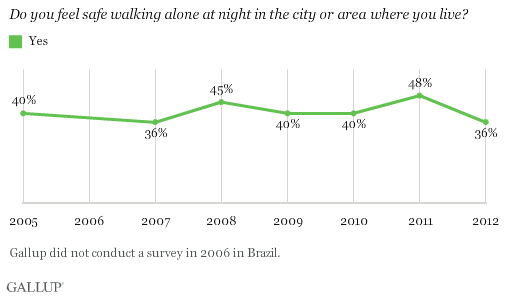WASHINGTON, D.C. -- As the largest protests in Brazil in more than 20 years take the country's leaders by surprise, Gallup data collected since 2005 offer insights into residents' growing dissatisfaction with public services, infrastructure, security, leadership, and level of corruption in their government.
Quick Summary: Protests that started in reaction to an increase in transportation fares have now ballooned to encompass a broad array of issues including corruption and discontent with the government. Some of Brazil's leaders are struggling to take stock of the situation. As Gilberto Carvalho, President Dilma Rousseff's secretary general, said during a congressional hearing, "It would be pretentious to say we understand what's going on." President Rousseff, though, believes she understands her citizens' grievances. She claims that, "The voices of the street want more citizenship, health, transport, opportunities."
Gallup data reveal that Brazilians' satisfaction with the availability of quality healthcare, the educational system or schools, and the public transportation system in their country have reached record lows, suggesting that protestors' views reflect those of much of the population. Further, Brazilians' perceptions of government corruption and lack of personal security rose during Rousseff's second year as president.
Satisfaction With Educational System and Healthcare at Record Low: Brazilians' satisfaction with the availability of quality healthcare in their communities fell to 25% in December 2012, down 16 percentage points since 2010 -- and the lowest on record. Slightly less than half (48%) were satisfied with the educational systems or schools in their areas, down nine points from 2010 -- and the lowest on record. Brazilians' satisfaction with healthcare and education is now among the lowest for 19 Latin American and Caribbean countries Gallup measured.

Satisfaction With Infrastructure Also on the Decline: The percentage of Brazilians satisfied with roads and highways in their area fell to 44% in 2012, from 53% in 2010. During the same time period, the percentage satisfied with public transportation systems in their area decreased to 48%, from 56%. Brazilians' likelihood to be satisfied with public transportation systems and roads and highways is among the lowest Gallup observed across 19 Latin America and Caribbean countries surveyed in 2012.

Perceptions of Government Corruption Rise in Rousseff's Second Year: Seven in 10 Brazilians believed that corruption throughout their country's government was widespread in late 2012, up nine points from 2010. Perceptions of government corruption are now back to where they were in 2009 and in earlier years. The percentage of Brazilians who say government corruption is widespread is close to the regional median of 19 countries in Latin America and the Caribbean.
The recent rise in the percentage of Brazilians who perceive widespread government corruption has been accompanied by a simultaneous decrease in leadership approval. In December 2012, 47% approved of the county's leaders, down from 68% in 2010. The current level of leadership approval in Brazil is now back on par with where it was in 2009 and is close to the regional median.

Perceptions of Security Fall Back to Previous Low Levels: The 36% of Brazilians who reported feeling safe walking alone at night in the city or area where they live in December 2012 is down 12 points from 2011 and back to levels seen in 2010 and previous years. Across the region, only Venezuelans are less likely to feel safe, at 26%.

Implications: Brazilians clearly became increasingly dissatisfied with numerous aspects of their society in late 2012. Their satisfaction with public transportation, educational systems, and the availability of quality healthcare declined to the lowest levels on record. And residents became less satisfied with their roads and highways. Perceptions of government corruption increased and perceived safety decreased to levels seen in previous years. This combination of growing dissatisfaction with public services and widespread perceptions of corruption and insecurity appears to be linked to the erosion in Brazilians' approval of their leaders.
The recent increase in bus fares at a time when the government is spending billions on preparing for the World Cup and the Summer Olympic Games appear to have been the tipping point that led to the recent eruptions in public discontent, which according to Gallup data, started to grow in 2011. Gallup will continue tracking Brazilians' satisfaction with public services and their country's leadership. Its surveys will offer insights into whether President Rousseff's bold plans to change the country's political system and the allocation of more than $22 billion to upgrade public transit systems will meet the demands of her citizens.
For complete data sets or custom research from the more than 150 countries Gallup continually surveys, please contact us.
Survey Methods
Results are based on face-to-face interviews with approximately 1,000 adults living in Brazil, aged 15 and older, conducted in November 2005, August 2007, September-October 2008, August-September 2009, August 2010, and December 2011. The latest survey was conducted from Dec. 1, 2012-Jan. 17, 2013, with most of the interviews completed in December. For results based on each total sample of adults, one can say with 95% confidence that the maximum margin of sampling error is ±3.4 percentage points.
In addition to sampling error, question wording and practical difficulties in conducting surveys can introduce error or bias into the findings of public opinion polls.
For more complete methodology and specific survey dates, please review Gallup's Country Data Set details.
